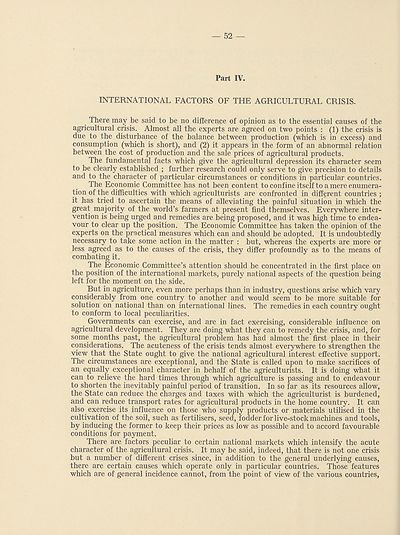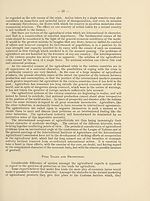Download files
Complete book:
Individual page:
Thumbnail gallery: Grid view | List view

52 —
Part IV.
INTERNATIONAL FACTORS OF THE AGRICULTURAL CRISIS.
There may be said to be no difference of opinion as to the essential causes of the
agricultural crisis. Almost all the experts are agreed on two points : (1) the crisis is
due to the disturbance of the balance between production (which is in excess) and
consumption (which is short), and (2) it appears in the form of an abnormal relation
between the cost of production and the sale prices of agricultural products.
The fundamental facts which give the agricultural depression its character seem
to be clearly established ; further research could only serve to give precision to details
and to the character of particular circumstances or conditions in particular countries.
The Economic Committee has not been content to confine itself to a mere enumera¬
tion of the difficulties with which agriculturists are confronted in different countries ;
it has tried to ascertain the means of alleviating the painful situation in which the
great majority of the world’s farmers at present find themselves. Everywhere inter¬
vention is being urged and remedies are being proposed, and it was high time to endea¬
vour to clear up the position. The Economic Committee has taken the opinion of the
experts on the practical measures which can and should be adopted. It is undoubtedly
necessary to take some action in the matter : but, whereas the experts are more or
less agreed as to the causes of the crisis, they differ profoundly as to the means of
combating it.
The Economic Committee’s attention should be concentrated in the first place on
the position of the international markets, purely national aspects of the question being
left for the moment on the side.
But in agriculture, even more perhaps than in industry, questions arise which vary
considerably from one country to another and would seem to be more suitable for
solution on national than on international lines. The remedies in each country ought
to conform to local peculiarities.
Governments can exercise, and are in fact exercising, considerable influence on
agricultural development. They are doing what they can to remedy the crisis, and, for
some months past, the agricultural problem has had almost the first place in their
considerations. The acuteness of the crisis tends almost everywhere to strengthen the
view that the State ought to give the national agricultural interest effective support.
The circumstances are exceptional, and the State is called upon to make sacrifices of
an equally exceptional character in behalf of the agriculturists. It is doing what it
can to relieve the hard times through which agriculture is passing and to endeavour
to shorten the inevitably painful period of transition. In so far as its resources allow,
the State can reduce the charges and taxes with which the agriculturist is burdened,
and can reduce transport rates for agricultural products in the home country. It can
also exercise its influence on those who supply products or materials utilised in the
cultivation of the soil, such as fertilisers, seed, fodder for live-stock machines and tools,
by inducing the former to keep their prices as low as possible and to accord favourable
conditions for payment.
There are factors peculiar to certain national markets which intensify the acute
character of the agricultural crisis. It may be said, indeed, that there is not one crisis
but a number of different crises since, in addition to the general underlying causes,
there are certain causes which operate only in particular countries. Those features
which are of general incidence cannot, from the point of view of the various countries.
Part IV.
INTERNATIONAL FACTORS OF THE AGRICULTURAL CRISIS.
There may be said to be no difference of opinion as to the essential causes of the
agricultural crisis. Almost all the experts are agreed on two points : (1) the crisis is
due to the disturbance of the balance between production (which is in excess) and
consumption (which is short), and (2) it appears in the form of an abnormal relation
between the cost of production and the sale prices of agricultural products.
The fundamental facts which give the agricultural depression its character seem
to be clearly established ; further research could only serve to give precision to details
and to the character of particular circumstances or conditions in particular countries.
The Economic Committee has not been content to confine itself to a mere enumera¬
tion of the difficulties with which agriculturists are confronted in different countries ;
it has tried to ascertain the means of alleviating the painful situation in which the
great majority of the world’s farmers at present find themselves. Everywhere inter¬
vention is being urged and remedies are being proposed, and it was high time to endea¬
vour to clear up the position. The Economic Committee has taken the opinion of the
experts on the practical measures which can and should be adopted. It is undoubtedly
necessary to take some action in the matter : but, whereas the experts are more or
less agreed as to the causes of the crisis, they differ profoundly as to the means of
combating it.
The Economic Committee’s attention should be concentrated in the first place on
the position of the international markets, purely national aspects of the question being
left for the moment on the side.
But in agriculture, even more perhaps than in industry, questions arise which vary
considerably from one country to another and would seem to be more suitable for
solution on national than on international lines. The remedies in each country ought
to conform to local peculiarities.
Governments can exercise, and are in fact exercising, considerable influence on
agricultural development. They are doing what they can to remedy the crisis, and, for
some months past, the agricultural problem has had almost the first place in their
considerations. The acuteness of the crisis tends almost everywhere to strengthen the
view that the State ought to give the national agricultural interest effective support.
The circumstances are exceptional, and the State is called upon to make sacrifices of
an equally exceptional character in behalf of the agriculturists. It is doing what it
can to relieve the hard times through which agriculture is passing and to endeavour
to shorten the inevitably painful period of transition. In so far as its resources allow,
the State can reduce the charges and taxes with which the agriculturist is burdened,
and can reduce transport rates for agricultural products in the home country. It can
also exercise its influence on those who supply products or materials utilised in the
cultivation of the soil, such as fertilisers, seed, fodder for live-stock machines and tools,
by inducing the former to keep their prices as low as possible and to accord favourable
conditions for payment.
There are factors peculiar to certain national markets which intensify the acute
character of the agricultural crisis. It may be said, indeed, that there is not one crisis
but a number of different crises since, in addition to the general underlying causes,
there are certain causes which operate only in particular countries. Those features
which are of general incidence cannot, from the point of view of the various countries.
Set display mode to:
![]() Universal Viewer |
Universal Viewer | ![]() Mirador |
Large image | Transcription
Mirador |
Large image | Transcription
Images and transcriptions on this page, including medium image downloads, may be used under the Creative Commons Attribution 4.0 International Licence unless otherwise stated. ![]()
| League of Nations > Economic and financial section > Agricultural crisis > Volume 1 > (54) |
|---|
| Permanent URL | https://digital.nls.uk/190903352 |
|---|
| Shelfmark | LN.II.2/2.(35) |
|---|---|
| Attribution and copyright: |
|
| Shelfmark | LN.II.2/2.(35-35) |
|---|---|
| Shelfmark | LN.II |
|---|
| Description | Over 1,200 documents from the non-political organs of the League of Nations that dealt with health, disarmament, economic and financial matters for the duration of the League (1919-1945). Also online are statistical bulletins, essential facts, and an overview of the League by the first Secretary General, Sir Eric Drummond. These items are part of the Official Publications collection at the National Library of Scotland. |
|---|---|
| Additional NLS resources: |
|

